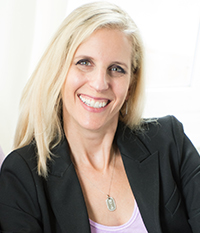On Karen Putz’s 44th birthday, the Naperville, Illinois, mom of three was sitting on a pontoon boat, feeling sorry for herself. Putz had been a water baby growing up, the only girl who could barefoot water-ski on the lake near her family’s summer home. But with age had come responsibilities — marriage, family, work — plus a slew of health issues. “I was very overweight, didn’t really exercise, and just assumed this was all part of the uphill battle of getting older,” she says.
Then Putz’s husband sent her a link to a “TODAY” show segment about a 66-year-old barefoot water-skier. “As I watched her, all I saw was this big, passionate smile on her face,” she recalls. “My whole outlook on life changed in that moment. Suddenly, 44 wasn’t old at all. If a 66-year-old could barefoot water-ski, I could too!” Putz reached out to her, and the two struck up a friendship. Before she knew it, Putz was back on the water. “I felt like a teenager again!” she remembers. “All the old joy and exhilaration came rushing back.” Now 53, Putz is a competitive barefoot water-skier and the author of multiple books, including “Unwrapping Your Passion: Creating the Life You Truly Want.”
Research shows that happier individuals are 35 percent less likely to die over the next five years. They’re also less likely to experience cancer, diabetes, heart disease, and other conditions. Putz discovered her fountain of youth in a cool, inviting lake, but you don’t need to strap yourself to a boat and race barefoot along the waves at 40 miles per hour to feel young. (Though it certainly might help.)
“Small steps can definitely add up to healthier aging,” says Barbara Hannah Grufferman, author of the AARP and National Geographic book “Love Your Age: The Small-Step Solution to a Better, Longer, Happier Life.” “You don’t have to go from zero exercise to running a marathon, or from eating burgers and fries to being a vegan. Relatively easy tweaks to existing habits can and will help, and one healthy habit will lead to another.” Keep reading for five surprising habits of people who age well.
1. They keep in touch with their friends

“Loneliness and social isolation have powerful effects on health,” says Elissa Epel, Ph.D., a professor in the department of psychiatry at the University of California, San Francisco and director of the UCSF Aging, Metabolism, and Emotions Center. Being disconnected from friends and family is linked with a higher risk of disease and earlier mortality. In fact, “it’s as big of a risk factor as smoking,” Epel says.
It’s not about being a social butterfly; quality trumps quantity. “You want to make sure you have someone you can depend on for support,” she explains. Consider signing up for a local class featuring an activity you enjoy, like painting or dance, to meet like-minded friends. Volunteering and religious activities are other opportunities for new friendships to develop organically.
2. They just do it
Having sex twice a week has been shown to improve immune function, and a British Journal of Urology International study found that men who ejaculate five times a week slash their prostate cancer risk by a third.
For women, various physiological and psychological factors can sometimes make intercourse less enjoyable with age, though; namely, the decrease in libido and vaginal dryness that accompany menopause.
Lauren Streicher, M.D., medical director of the Northwestern Medicine Center for Sexual Medicine and Menopause in Chicago, says that vaginas have a use-it-or-lose-it mentality when it comes to staying supple and moist. “Women who have had a long sexual hiatus, whether as a result of pain during intercourse, being between partners, or some other factor, are more likely to have their tissue dry up.”
Her prescription? Regular stimulation of the tissue, either via sex or masturbation, to help maintain blood flow, which in turn increases lubrication. And stock up on silicone-based lube — it’s more slippery and lasts longer than water-based.
3. They eat (good) fat

The healthy, unsaturated fats found in olive oil, salmon, and nuts can keep your brain and body humming well into old age. When Harvard researchers followed 6,000-plus older women for four years, they found that higher saturated fat intake was associated with worse cognitive health and memory, while higher monounsaturated fat intake was related to improvements in both categories.
And in Ikaria, Greece, known as a “Blue Zone,” or one of the handful of cities worldwide where people live longer and generally healthier lives compared with everyone else, people suffer dementia at a quarter the rate of that in the U.S. Men there, in particular, are about four times as likely to reach age 90 as Americans, says Dan Buettner, author of “The Blue Zones: Lessons for Living Longer From the People Who’ve Lived the Longest.”
The typical diet of Ikarians? Rich in unsaturated plant oils, along with plenty of vegetables and fruits, beans, and whole grains, with meat eaten only sparingly. (Heart disease, depression, and diabetes are also rare in this Greek community.)
That diet sounds very similar to the hybrid Mediterranean-Dietary Approaches to Stop Hypertension (DASH) diet endorsed by the Chicago-based Alzheimer’s Association for preventing or slowing cognitive decline. Aim for the following: two to three servings of good-for-you fats a day; seven to eight servings a day of grains; four to five servings each of fruits and veggies a day; two to three servings of low-fat dairy products a day; two or less servings of meat, fish, or poultry a day; four to five servings of nuts a week; limit sweets as much as possible.
4. They push themselves

“People think as we get older, we should slow down, not push ourselves as much,” Grufferman says. “On the contrary. We need to push ourselves even more. You can make changes on a deep cellular level by pushing your body out of its comfort zone.” That’s what she herself did when she started running at age 50. “I was dealing with menopause and suffering from what I now call ‘a case of the umpies’ — frumpy, grumpy, and lumpy.”
One day, while watching runners from the New York City Marathon run past her and her family, Grufferman decided to get moving, starting with walking three mornings a week. Walking led to jogging, jogging led to running, and Grufferman, now 61, is currently training for her sixth marathon. “The amazing thing to me is that even though I’m getting older, I’ve gotten faster, setting a personal record with each race. The human body is capable of doing so much more than we realize.”
Feeling inspired but new to running? She recommends the Jeff Galloway Run/Walk/Run program. (Galloway was a U.S. track Olympian in 1972.)
5. They take care of their mind by taking care of their heart

Your brain only weighs about three pounds, yet it demands 20 percent of the oxygen and nutrients you take in to function optimally. The best way to get that energy to the brain is through a healthy cardiovascular system, says Keith Fargo, Ph.D., director of Scientific Programs and Outreach for the Alzheimer’s Association. “The average person knows that eating poorly and being a couch potato is bad for the body, but they think it stops at the neck,” he says. “That’s not true. With every heartbeat, your arteries carry about 20 to 25 percent of your blood to your brain, where billions of cells utilize the oxygen and nutrients. So anything you do for heart health is generally good for brain health.” That means following your doctor’s recommendations for blood pressure and cholesterol levels, exercising, and managing your weight. It’s not as sexy as lube and a vibrator, but it works.
 Leslie Goldman is a freelance writer who specializes in health, women’s issues, and parenting. She is a regular contributor to O: The Oprah Magazine, Women’s Health, Better Homes & Gardens, Parents, and more. Follow her on Twitter.
Leslie Goldman is a freelance writer who specializes in health, women’s issues, and parenting. She is a regular contributor to O: The Oprah Magazine, Women’s Health, Better Homes & Gardens, Parents, and more. Follow her on Twitter.
